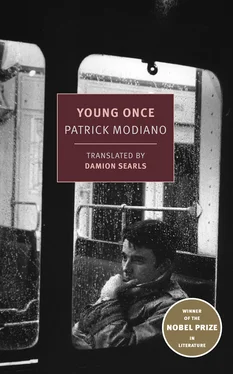“Nicole Haas, a friend… Mr. and Mrs. Memling… You remember, Coco, it’s Mrs. Memling, who sings ‘La Chanson des rues’ so beautifully.”
He always called them that, in a ceremonious tone, because he’d thought it was funny when he read “Mr. and Mrs. Memling” on the list of tenants in their apartment building.
“Good idea,” he’d told Louis. “That looks more serious. Now you need to get married. I’ll be your best man if you want.”
Nicole Haas had an elegant face but severe features. She was tall, almost Bejardy’s height, and Louis was struck by her boyish looks, especially her way of smoking and of sitting with her legs outstretched, high heels resting on the low table.
“Dinner is served, monsieur,” Brossier said formally.
“Louis, sit on Coco’s right. Mrs. Memling on my right…”
No one spoke much during lunch. Nicole Haas, at the head of the table, seemed to be in a bad mood. Bejardy gazed lovingly at her. She was younger than him — barely thirty.
“Are you going riding this afternoon, Coco?” Bejardy asked.
“No. I have to go to Equistable. I need a saddle.”
She pouted and, with a nonchalant gesture, poured herself a large glass of water.
“Equistable is a good place to buy one, I think,” Brossier said.
She shrugged. “Yes, but I usually go to Ramaget.”
She seemed annoyed at Bejardy and Brossier, but curious about and friendly toward Odile and Louis.
“Do you ride?”
“No,” Odile said.
“Why haven’t you ever invited them to Vertbois?” she asked Bejardy.
“We’ll invite them this summer, Nicole.”
She turned back to Odile and Louis and smiled at them.
“If he brings you to Vertbois, I’ll teach you how to ride a horse.”
“Vertbois is a… family property, in Sologne,” Bejardy said. “You’ll have to see it sometime.”
“Vertbois is the cradle of the Counts of Bejardy,” Nicole Haas said ironically. “Second Empire ‘nobility.’ Roland added the ‘de’ himself.”
This time, Bejardy lost his temper, and the subservient look he had been giving Nicole Haas grew hard.
“Nonsense, Coco. Louis, my boy, you have before you a textbook case of snobbery. Nicole here is obsessed with the aristocracy.”
Nicole Haas burst out laughing and lit a cigarette.
“Stop, you fool.” Loving contempt for Bejardy shone through her words.
A tray with coffee was waiting on the desk on the other side of the room. In the hall, Nicole Haas opened a window and the wind billowed the gauze curtains. Bejardy served the coffee himself.
Nicole Haas, Odile, and Louis were sitting on the velvet sofa. Bejardy and Brossier, leaning on the desk, kept silent, perhaps afraid to provoke a bad-tempered word from Nicole Haas. But she was ignoring them.
She took a leather cigarette case out of her bag and held it out to Odile, then to Louis. She lit their cigarettes herself, with a lighter that had a high flame. Louis was surprised to see it in her hand: It was one of the Zippo lighters from the American army that they had tried to get ahold of at all costs when he was in boarding school.
“Coco, do you want me to come with you to Equistable?”
But she turned to Louis: “You have a nice name, Monsieur de Memling.”
“His name is just Memling, no ‘de,’ ” Bejardy said.
She didn’t listen to him. She smoked her cigarette and watched the gauze curtains, bathed in sunlight, that the wind was waving back and forth like a fluttering scarf.
•
Nicole Haas suddenly stood up and went over to the ashtray on Bejardy’s desk to put out her cigarette.
“I have to go.”
“Do you need the car?” Bejardy asked.
“No.”
She shook hands with Odile and Louis.
“I hope to see you again.”
And, without paying the least attention to Bejardy, she headed for the door.
“See you tonight, Coco,” Bejardy said. “Be good.”
She did not even take the trouble to turn around, and shut the door behind her. Brossier gave a little nervous smile. Bejardy sat down on the sofa, next to Odile and Louis, and sighed.
“She’s not a bad girl, despite how it looks. Louis, I have to talk to you… Let’s go to the next room for a minute.”
“Tell me, Madame Memling, would you care to play a game of chess while they’re talking?” Brossier suggested.
“Why not?” Odile said, keeping her eye on Louis as Bejardy led him into the next room with a hand on his shoulder, a gesture meant to be protective and friendly.
•
They walked into the room where Odile and Louis had spent the night. The bright Citroën factory building on the other side of the Seine looked like it belonged in an airfield.
“Nice view, hmm?” Bejardy said. “When I started out, I had a garage in that neighborhood there, across the river. Rue Balard. Back when I would go see your father race… I saw him race for the first time in 1938, at the Vel’ d’Hiv. I was sixteen.”
“Did you know him?” Louis asked.
“No. I knew Aerts, and Charles Pélissier, but I spent more time with automobile people.”
Was it the mention of his father, or the term Bejardy used, “automobile people,” which sounded a bit like “captains of industry” or “gentleman rider”? Whatever the reason, Louis suddenly saw himself in a large, chilly, unused garage. Rays of sunlight were falling through a glass roof. The branches outside traced shadows on the floor like the shadows of leaves on the surface of a lake.
His childhood.
Bejardy had lain down on the bed and was resting his feet on the padded bedposts so as not to get the satin bedspread dirty. Louis stayed standing, by the window.
“So here it is. I need you to do something for me. You’re taking a little trip to England.”
•
In the living room, sitting at the low table, Brossier and Odile were absorbed in their chess game. Odile had acquired a taste for it under Mary’s influence; it was Mary who had taught her and Louis how the pieces moved.
Bejardy and Louis followed the game in silence. After ten or fifteen minutes, Odile said checkmate. Brossier was not a very expert player either.
“A formidable opponent, our little Mrs. Memling,” Brossier said with a smile.
•
Outside, they walked in the direction of Porte d’Auteuil. The streets were deserted. Now and then a bus would pass, and its whir would dissipate in the sunlight.
They felt light, as if they were breathing in the open air again after a long time underwater. Maybe, Louis thought, it was because winter was over. He remembered back to December, leaving his barracks with his soggy shoes. The swishy watery noise they made with every step gave him the feeling of being permanently bogged down. Now he would happily run barefoot on the dry sidewalk.
“What are you thinking about?” Odile asked him, taking his arm.
“We’re going to England. I’ll explain…”
“To England?”
She was unfazed. This afternoon, anything seemed possible to her.
They eventually reached the edge of the Bois de Boulogne. Loud groups of people were making their way to the racetrack entrance.
“Let’s take a boat ride,” Louis said.
On their way to the lake, they changed their mind. The wind gently stirring the leaves and scattering the children’s laughs and screams, the sun, the prospect of this trip to England — it all made them lazy. They sat down at an outdoor table at the Auteuil farm and ordered two cherry milks.
They didn’t talk. Odile rested her head on Louis’s shoulder and drank her white grenadine through a straw. Down on the riding path, an Amazonian brunette riding a spotted gray horse passed slowly by, and they thought they recognized Nicole Haas.
Читать дальше












